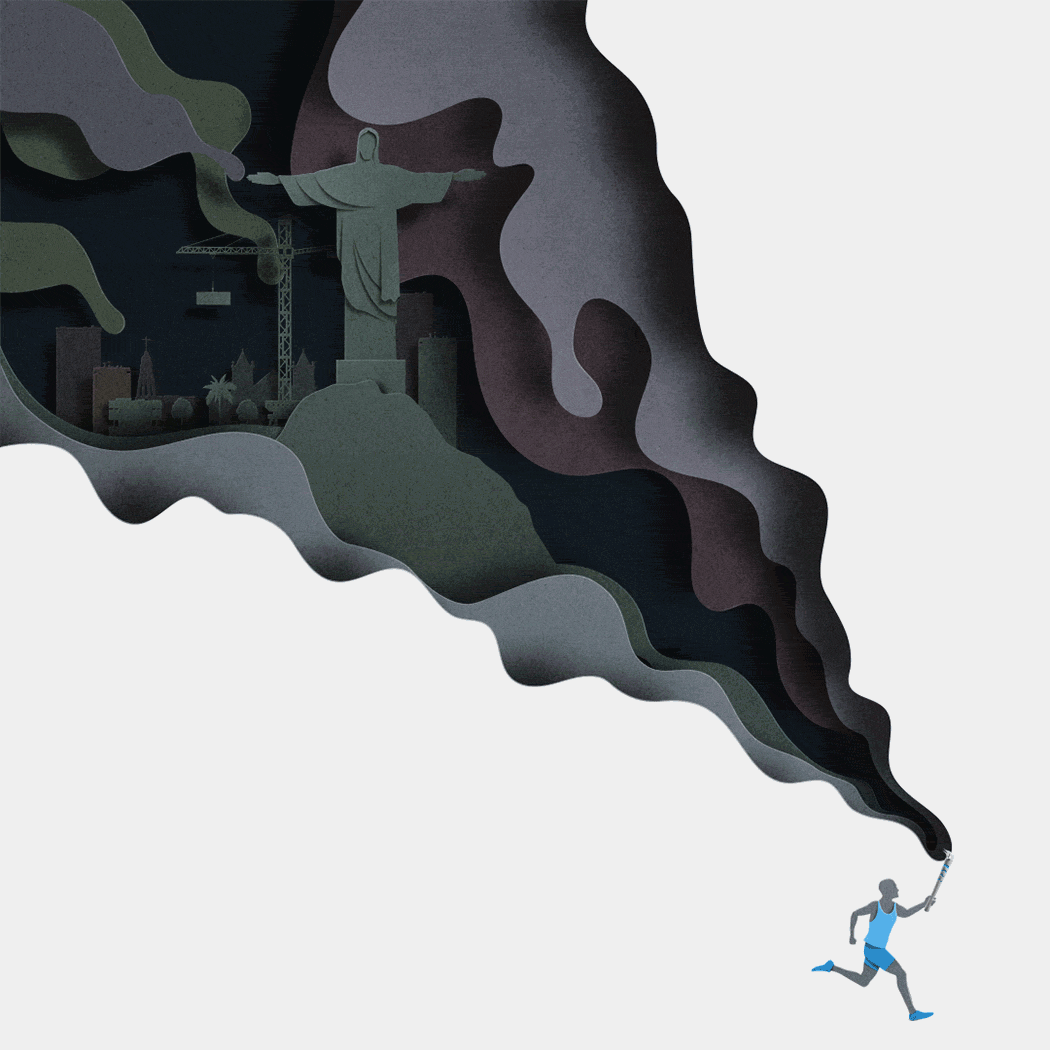
The New York Times
July 1st, 2016
by Vanessa Barbara
Contributing Op-Ed Writer
RIO DE JANEIRO — IT’S official: The Olympic Games in Rio are an unnatural disaster.
On June 17, fewer than 50 days before the start of the Games, the state of Rio de Janeiro declared a “state of public calamity.” A financial crisis is preventing the state from honoring its commitments to the Olympic and Paralympic Games, the governor said. That crisis is so severe, he said, it could eventually bring about “a total collapse in public security, health, education, mobility and environmental management.” The authorities are now authorized to ration essential public services and the state is eligible for emergency funds from the federal government.
Measures like these are usually taken for an earthquake or a flood. But the Olympics are a man-made, foreseeable, preventable catastrophe.
I went to Rio recently to see how preparations for the Games are going. Spoiler: not well. The city is a huge construction site. Bricks and pipes are piled everywhere; a few workers lazily push wheelbarrows as if the Games were scheduled for 2017. Nobody knows what the construction sites will become, not even the people working on them: “It’s for the Olympics” was the unanimous reply, followed by speculation about “tents for the judging panels of volleyball or soccer, I guess.”

An aerial view of the Olympic beach volleyball arena on Copacabana Beach in June. Credit: Rafael Fabres for The New York Times
I asked the Rio 2016 press office for a tour, but it olympically ignored me. Almost all venues are still under construction. I managed to see part of the Barra Olympic Park, which will host many of the events, after buying a last-minute ticket to a Volleyball World League match. Although construction for the Games is progressing, it appears far from “97 percent complete,” as the organizers claimed recently.
I also saw most of the Deodoro Olympic Park, which is apparently open to anyone who wants to see it. I walked straight in and found half-built grandstands abandoned in the middle of a Friday afternoon.
The few projects that have been completed don’t inspire much confidence. In April, a newly built bike path along Rio’s seashore collapsed, killing two people.
Work on the beach volleyball arena at Copacabana stalled because the organizers failed to get the proper environmental licenses. Then the structure was damaged by waves. Workers erected a six-foot-high sand barrier to protect the site. It also protects thugs; tourists are being mugged behind it. A construction worker told me he’d seen a man stabbed there, and warned me to stay away. The robbers were so comfortable that they had left their backpacks and a beach chair nearby on the sand.

Workers prepare the beach volleyball arena on Copacabana beach. Credit: Rafael Fabres for The New York Times
Safety is of great concern to athletes and tourists. They are right to worry. According to local news reports, drug traffickers are involved in territorial disputes in at least 20 Rio neighborhoods.
Eight years ago, the government established the Pacifying Police Units, a heavily armed force that tries to reclaim favelas from the gangs. But these units seem to have worsened the drug war rather than ended it. This year, 43 police officers have been killed in the state, and at least 238 civilians have been killed by the police. The United Nations has said it’s concerned about violence by the military police and the officers in the favelas, notably against children living on the streets. Everybody fears an increase in police violence during the Games. The country will deploy 85,000 soldiers and police officers, about twice the number used in the London 2012 Olympics.
Frequent shootouts near the Olympic arenas and on routes to them are also a concern: 76 people have been hit by stray bullets in Rio so far this year; 21 of them have died. On June 19, more than 20 men carrying assault rifles and hand grenades stormed the city’s largest public hospital to free an alleged drug kingpin in police custody, leaving one person dead and two hurt.
And the 500,000 people expected to visit for the Games should be worried about how easily they could wander into dangerous areas: There’s a dearth of signs and tourist information on the streets and on public transportation. A native Brazilian, I spent half an hour at the central train station just trying to figure out where to catch a bus to the Olympic Park — and I’d looked it up beforehand. The information booth inside the station was empty. Outside, few of the bus stops displayed information about which lines went where. I resorted to asking popcorn vendors and passers-by for directions. I’m glad I speak Portuguese.
HOW did everything get so messed up? Money is one problem. “The state is bankrupt,” Francisco Dornelles, the interim Rio governor, admitted in an interview with a magazine two weeks ago.
The incumbent governor, who has lymphoma, is on sick leave. Just before Christmas, he declared a “health system emergency” as hospitals closed units and money ran out for equipment, supplies and salaries. Months later, the state started delaying civil servants’ salaries and pension checks. Teachers have gone on strike and students have occupied dozens of schools in protest. The state already owes $21 billion to Brazil’s federal government and $10 billion to public banks and international lenders. A budget shortfall of $5.5 billion is projected for this year. An $860 million loan has already been granted to help cover the cost of security at the Games.
The fiscal disaster could be attributed to many factors, including a national economic crisis — but the huge expansion of the government payroll and reckless spending for the Olympics are likely causes.
However, the mayor of the capital, Eduardo Paes, claimed that City Hall is in good financial shape and that the fiscal situation would not affect Olympic preparations.
So if it’s not only money, maybe the problem is also politics. Brazil is, of course, having a major political crisis. The president, Dilma Rousseff, was forced to step aside on May 12 because of allegations that she manipulated the state budget. The political turmoil has paralyzed the country and frozen the economy. Decisions on important reforms and infrastructure projects are being delayed, and the uncertainty has discouraged investment. But Leonardo Picciani, who took over as sports minister after Ms. Rousseff’s suspension, asserts that the Games will be “fantastic.” Almost everything was ready by the time he took up his post, he claims.
Mr. Picciani has also tried to minimize concerns over the mosquito-borne Zika virus, declaring that all the proper preventive measures are in place. That hasn’t stopped athletes like Jason Day, the world’s No. 1 ranked golfer, from announcing that they’re skipping the Olympics because of Zika. In an open letter last month, 150 prominent doctors, bioethicists and scientists from around the world asked for the Olympics to be moved or postponed because of the Zika epidemic.
In Brazil, these concerns are generally greeted with scorn. First, August is the middle of winter here, so the weather will be drier and cooler, meaning fewer mosquitoes. Second — and more important — the virus seems like a relatively minor problem: According to one calculation, in Rio a woman is more than 10 times more likely to be raped than catch Zika. (Men are more likely to be shot to death.)
This is certainly not the first time a host country’s handling of the Games has looked disastrous. The 2014 Winter Olympics in Sochi, Russia, was plagued by reports of faulty plumbing in shoddily built hotels. Fears of swine flu stalked the 2010 Games in Vancouver, Canada. Greece barely finished construction before the opening ceremony in 2004.
Perhaps, as sometimes happens in Brazil, everything will turn out fine and the Olympics will be a success. The Games will cap 10 years of mega-events in Rio, starting with the Pan-American Games in 2007, followed by the 2011 Military World Games, the 2013 FIFA Confederations Cup and the 2014 World Cup. Remarkably, they all went off without any notable catastrophes. (The same could be said about the Carnival and New Year’s Eve, both of which attract about a million tourists every year.)

A bridge under construction for a new metro line in Rio de Janeiro. Credit: Rafael Fabres for The New York Times
All these projects had one thing in common: Regular citizens were excluded from the decision-making. The government has used the coming Games to speed up certain development projects — not all of them the public’s priorities. The mayor joked about it in a 2012 TV interview: “The Olympics pretext is awesome; I need to use it as an excuse for everything,” he said. “Now all that I need to do, I will do for the Olympics. Some things could be really related to the Games, others have nothing to do with them.”
The favela Providência is a good example of what’s wrong with the mayor’s approach. The residents there asked for water and basic sanitation. Instead, they got a $22 million gondola, primarily for tourists. Similarly, six stations were built on a subway line that connects wealthy beachside neighborhoods to Jardim Oceânico, a station (sort of) near the Olympic Park. But most of Rio’s residents would have preferred to see the construction of a different line that connects the city center to the less-ritzy municipalities of Niterói and São Gonçalo, where many working people live, a project that would have cost half the price.
The Olympics are predicted to cost $12 billion. More than 40 percent of that will come from public funds, the rest from private lenders. But critics say that the official budget doesn’t include tax exemptions for the companies involved in organizing and hosting the event, the cost of temporary grandstands and compensation for families evicted to make way for Olympic construction.
According to a report released in November by an advocacy group that is monitoring the preparations for the Olympics, at least 4,120 families have been kicked out of their homes because of the Games. (The government disputes this number, saying that most of the displaced were moved because they lived in areas prone to flooding and landslides.) “In all cases, evictions occurred without residents’ access to information and without public discussion of the urbanization projects,” the report says. These families were often offered compensation well below their homes’ market value or, if they were lucky, new apartments in neighborhoods as far as 35 miles away.
Homeless people in Rio told me that police officers are forcing them off sidewalks and dragging them to filthy shelters to start “cleaning up” the streets before the influx of visitors. The evictions often take place at 3 a.m. with the help of police dogs and pepper spray, and sometimes horses. There are also reports that street children have been arbitrarily placed in juvenile detention centers.
Somebody will profit from the Games, but it won’t be the majority of Rio’s population. Eighty percent of the investments were made in the wealthy Barra da Tijuca neighborhood, known as Rio’s Miami. An Olympic golf course was built there, inside an Area of Environmental Protection. The city already has two big golf courses, and very few Brazilians play golf.
Two of the biggest winners of Rio 2016 will be the contractors and the landowners — particularly Carlos Carvalho, who owns at least 65 million square feet of land in and around the Barra Olympic Park and the athletes’ village. Last year he told The Guardian that he wants Barra to be cleared of poor communities. When the Games are over, the village will be converted into an area of luxury housing called “Ilha Pura” — Pure Island.
The governor was right: It’s a calamity.

